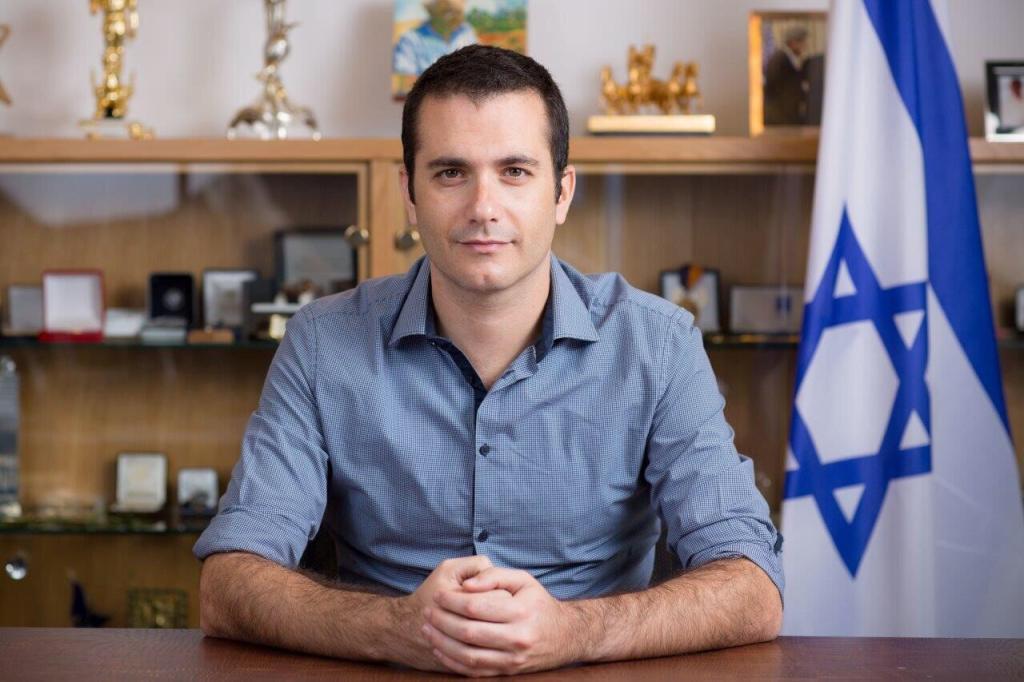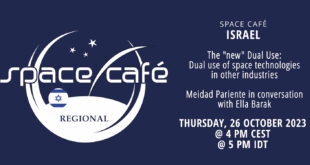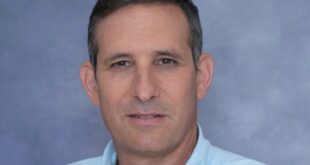
By Meidad Pariente
In the Fifth episode of Space Café Israel, Meidad Pariente is in conversation with Mr. Ran Livne.
Can you share something personal that isn’t written in your LinkedIn profile?
I think it’s on my LinkedIn page, but you must dig behind or under everything to find it. My BA is actually on literature and sociology. Usually, people’s reaction is, “this guy is a space dude, so either he studied engineering or finance or economics,” but my BA from Tel Aviv university is in sociology and literature. And if you ask me, I think that this is one of the most influential things that I’ve done. Tel Aviv School of literature at the University is unique because its paradigm claims that “everything is a text.” Even when you see art or when you listen to music, you translate it into words, and open up your emotions. My MBA was from the Interdisciplinary Center in Herzliya and the Wharton School, At Penn university, there is a global consulting track which is mutual. When I started practicing business consulting after studying at the university, I realized that studying literature gave me quite an advantage. And the main reason for that is storytelling.
I mean, you know, as an entrepreneur that at the end of the day, it’s much more important than your product, your market, your business cases, whether you can tell your actual story. In Harvard business school today, in the MBA, one of the main courses is storytelling. So it kind of feels like it influenced my life for the best. I wanted to write books when I was a teenager and at beginning of the my twenties but eventually became a spokesperson. But still, it’s one of the essences of what I’m doing, trying to tell good stories and understanding other people’s stories.
From your point of view, what are the most promising outcomes from the 35 experiments done during the Rakia mission?
In January, the Ramon Foundation and Rakia are going to do a conference to present the scientific results, which will be kind of promising. So while I know most of the results, I’m not supposed to talk, about them.I assume it is going to be a great party because it was quite a success. I can tell you that. I loved all of the experiments. I love the fact that you had actual proof of concept for space systems. NSLcomm sent an experiment that saved them a lot of money because instead of sending and launching a complete satellite, they launched only the antenna and managed to take pictures of it from different angles (pictures of the antenna deployment – m.p). It was pretty successful for them, and I assume that they will publish the results shortly. The most famous one is groundbreaking. The Flute experiment led by Prof. Moran Berkowitz from the Technion together with MIT and NASA Ames. These guys are manufacturing liquid eye lenses (to support weaken eyesight in space – m.p) which is quite remarkable. which was really lovely to see how Eytan Stibbe operated the experiment. One of the great things in human spaceflight, that it is very visual. I mean, at the end of the day, you can see someone that’s constructing and playing, unlike a satellite that you don’t necessarily see how it rotates. And it’s bricks and metal. I remember sitting and seeing Eytan manufacturing the lenses and examining them and taking out the bubbles from them, it’s just phenomenal. So there were some really high engineering (experiments – m.p) and also the medical stuff is quite exciting. The experiment by brain.space that was the first time that they actually monitored the brain 360 degrees in realtime, and managed to get live telemetry. That was entirely groundbreaking. It was a phenomenal kaleidoscope of different sciene and engineering.
I think the main challenge for space entrepreneurs is the mindset that people are falling in love with technology and not necessarily the market. I think the key challenge of the space industry is to understand where the market is going and generate a real Low Earth Orbit economy.
Congratulations on your new position. Can you share the challenges that made you choose this career path? Why ISI and why this role?
If you met me seven or eight years ago, and asked about my carrier, I would have tell you that I’ll probably end up in the Israeli public sector. I decided two or three years ago, around the beginning of the Rakia mission which made me realize that probably my future is not there. And that I love space. Today we’re living in a flat world, you know, I’m staying here in Las Vegas and meeting all of these companies that are doing Cloud Analytics. You realize how much flat the world is. you’re meeting with a company that has four employees. One of them is in Spain, one in Scotland, one in Denmark and one in the US. So I think that the first decision was that I want to do space (work in the space industry – m.p). The second decision was with my wife, you know, eventually we keep on talking about careers. If you ask me, any intelligent talk about a carrier, has to start with your family. What’s your aspirations? What are you doing? So we decided my wife and I, that we want to live in Israel, and I wanted to do commercial space, because I was still in a nonprofit. And to have a very genuine business experience, because even when I worked in consulting, I was still doing a lot of public sector consulting work. I think that in Israel, the spacy ecosystem is composed out of 40 to 60 companies, not all of them are completely new space. I mean, Stemrad are doing phenomenal job and have the radiation vest. Now flying on Artemis-I mission, they are not necessarily a space company, building radiation vests, which is amazing. So I wanted a new space company that will be doing only space, and that will be competitive, which means we’ll have the potential to be one of the biggest in the world. ISI is a public company and I can’t talk about all of our business and what we’re doing, but ISI ,today. is the biggest space company in Israel. Obviously, IAI is much bigger. But if you’re looking only on Space, ISI is going to be a huge force that’s growing in the global space ecosystem. I’m here in AWS, doing presentations, going into meetings after Maxar and Planet and Satellogic and BlackSkies of the world, we are not that far behind. Sometimes we’re even ahead, which is phenomenal. And the company is very agile. I mean, I think that you said it. I know this company for 22 years. Today, it’s much younger than it was seven years ago. The real turning point was when the company got new management in 2015, and kind of shifted from aerospace company that operated satellites into a high tech company that does lots of analytics. I think that around 40% of the employees are doing R&D actually. And looking for the most extreme use cases, they’re very agile. And I love the atmosphere. I mean, despite the fact that it’s a well established company, it’s very agile, have very innovative and entrepreneurial point of view. I mean, at the end of the day, we’re Israelis, the key advantage of Israelis is not that we are the smartest ones or have the best work ethics. It is the fact that we’re very agile. We say that nothing is impossible. I don’t like to say “chutzpah”. But you know, Charlie Bolden (former NASA administrator) once told me ”Don’t forget that it’s not the size of the dog in the fight. It’s the size of the fight in the dog.” So when you’re looking at the fact that ISI won the Chilean tender, building a space ecosystem, the fact that the company actually competed head to head with the biggest companies in the world and won, shows a lot about the spirit and the fact that nothing is impossible. I love the fact that in terms of the use cases that the company is doing, its all cutting edge and everythings possible.
As someone who did not start his career in the space industry. What advice would you give to someone who wants to do the same?
Usually when I give presentations about use cases I’m trying to compare the Apollo 11 control room in NASA, to the SpaceX control room when they launched the first reusable Falcon-9. And you could see the different faces, as you said, we (the space industry – m.p) are a very “gray hair” industry becoming a very young one. Space industry was never so open as it is today. I studied literature and sociology, I started from this, so simply apply to a space company, this is the best advice I can give you. You can also go to the ISU, which is phenomenal. And I’m a true advocate of the International Space University, try to apply to their programs, but at the end of the day start working in the industry. The presentation that I was giving yesterday here in Las Vegas in the AWS conference, of these guys who did onboard processing with D-Orbit, two engineers that had no background in space, they said “we realized that there are limitations and everything, but space becoming much more accessible” You used to need at least a PhD or a Master degree to be a C-level in a space company. Today, young people are entering a space space company by simply applying to it and start working. This is the best experience you can have.
what do you think will be the best attribute of the Israeli space industry in 2050?
I’ve been saying it for a long time. The point is that Israel needs to find its niche. During the first meeting I had with the former science Minister (Shai Izhar – m.p), I talked to him about mobility, and he kind of took it and throw it away. In 2008, Israel had 40 companies that did automotive. In 2018, there were around 700. Today, we have around 800. So if anyone is buying a car today, it most probably has Israeli technology. And the reason for it, is the fact that in this huge automotive industry, Israel have no heritage in automotive, we never manufactured cars (actually, there were several cars manufactured in Israel – m.p ) . We’re not Japan, France, Italy, or the US. We have no idea how a motor or an engine looks like but Israeli intrapreneurs found the niche, the niche was data science, cyber and sensors, this is what all of these 800 startups are doing. So if you’re looking at about a space, space assets, humans in space, I assume that Israel will have two or three main contribution that are completely the opposite of what the government is now spending money on, which is mainly satellites and big projects. The essence, if you ask me is about the contribution of Israel to the huge wave called new space. So in 2050, Humanity will have, let’s say a couple of dozens of people, maybe more living and working in space, we’ll have two or three or four space stations. Earth will be monitored by very high resolution satellites, maybe 10 centimeters per pixel from low Earth orbit. We’ll have lots of constellation for precise positioning, and huge amount of communication satellites, that will be able to provide connectivity all over. I think that Israel’s main contribution is going to be in three different fields. One, cyber, the reason for that is that we’re strong in it today. I think that cyber companies in Israel generate around 10% of the revenues in cyber world, which is phenomenal. Second thing is coping with data, analyzing a huge amount of petabytes and petabytes of data that will be generated and distributed through space. And the third thing, which I think that Israel is quite strong in today for terrestrial application, is bioconvergence, and biomed. Again, I don’t know how much big this market is going to be, but we’ll find probably Israeli solutions over there. These are the main three fields that I think that Israel will be a key player in, in order to for that to happen. We must have Low Earth Orbit economy. And you can see it now formulating and you can see now more and more and more space companies forming. So these are main three fields, I think Israel can be a key player in.
Mr. Ran Livne. has been the director-general of the Ramon Foundation since June 2015. The foundation has 101 employees and is one of Israel’s most prominent non-profits. In recent years, the foundation’s educational activities, established by Rona Ramon, have spread to all parts of Israel (80 local municipalities) and became global- with operations in Singapore, Ghana, Chile, and Slovenia. At the same time, the foundation became a key player in the Spacetech scene in Israel as it facilitates the Israeli space agency’s innovation workshops, international conferences, meetups, and accelerators. Today Ran is a senior director of Marketing and Business Development at Imagesat international.
 SpaceWatch.Global An independent perspective on space
SpaceWatch.Global An independent perspective on space




